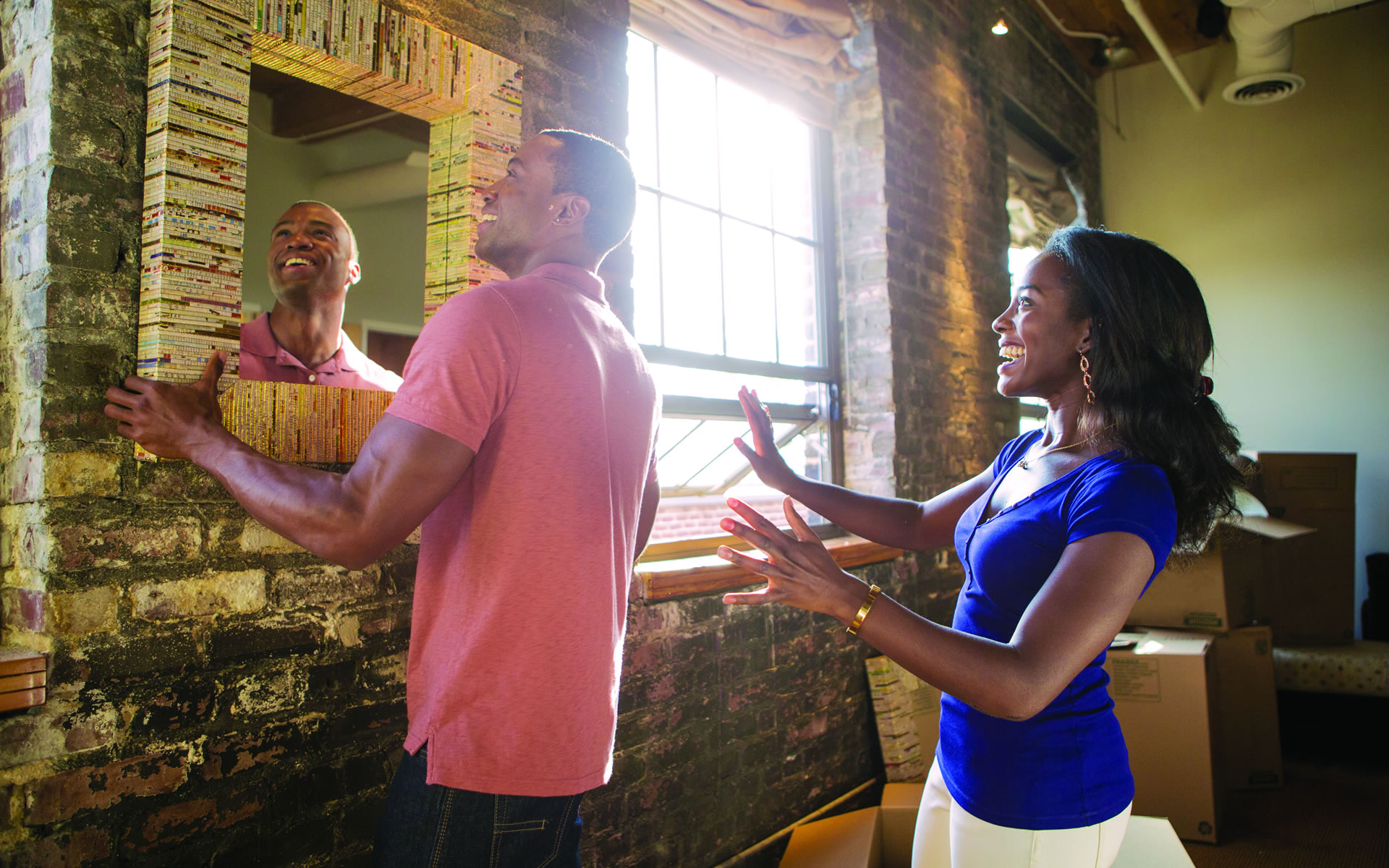Removing the Mysteries Behind Co-Ops and How They Work
 “Co-op,” which is short for “housing cooperative,” is one of those real estate terms that I have heard about in passing, but never really had a full understanding of what it meant. I knew a co-op was some kind of apartment, but that’s about it. If you have never owned a co-op, there’s the possibility that your understanding of what it is might be a little vague. This week, we will talk about what a co-op is and the pros and cons of living in one. Afterwards, you will leave here with an extra nugget of useful real estate knowledge!
“Co-op,” which is short for “housing cooperative,” is one of those real estate terms that I have heard about in passing, but never really had a full understanding of what it meant. I knew a co-op was some kind of apartment, but that’s about it. If you have never owned a co-op, there’s the possibility that your understanding of what it is might be a little vague. This week, we will talk about what a co-op is and the pros and cons of living in one. Afterwards, you will leave here with an extra nugget of useful real estate knowledge!
Unlike a condominium, a co-op is owned by a corporation, which means that you’re not buying actual property, but are instead buying shares of the corporation. Typically, the size of your apartment correlates with how many shares you have bought. Because everyone who lives in a co-op owns shares within the corporation, they are usually concerned about who the building does and does not allow to live there. If you don’t meet the standards and requirements set by the co-op board, then you will not be given an apartment.
Now that you have an understanding of what a co-op is, we will now go over the three types. Before you look into any co-op, it’s important that you know the differences between each type. First, there are market-rate co-ops, which are treated similar to most standard residential properties. If you live in this type of co-op, you are permitted to sell your shares whenever you want and for how much money you want.
The second kind is a limited equity co-op, which is mostly meant to attract those who are looking for affordable housing. For these co-ops, there is a limit on how much equity you can earn in your home, and this prevents you from selling your share for a considerable profit. This is meant to help the co-op communities remain affordable.
The third type of co-op is group equity, which is also known as zero equity. In these co-ops, you don’t gain any equity in your home, but instead pay rental rates that are below market value.
Of course, whenever you look for new housing, one of the things always on your mind is affordability, and when you consider a co-op, affordability is possible because, compared to a condo, co-ops are usually less expensive. When you live in a larger co-op, you won’t have any responsibilities regarding upkeep. In these co-ops, a paid crew takes care of all maintenance, repairs, and security. It is for this reason that older buyers are drawn to the bigger co-ops because they know they won’t have to stress over taking care of the building’s exterior. However, smaller co-ops are usually self-managed, so you handle things like shoveling snow, but benefit from lower maintenance costs. Both large and small co-ops have their perks, so choose whichever size works best for you.
A main detractor of trying to move into a co-op is getting through the approval process. Before the co-op board hands you your keys, you have to be interviewed and provide documentation that may include tax records from the past several years. Similar to if you were looking to move into a regular house, doing so for a co-op has its own share of work.
If you have dreamt about moving into a new space with the desire to renovate, it won’t be easy if you move into a co-op. In this scenario, you have to discuss possible renovations with the board and see if your plans meet their approval. After going through the interviews with the board when trying to get accepted into the building, I’m sure one of the last things you want to do is go in front of the board for more discourse.
Although co-ops are mostly found in cities, one of the best parts about them is that they come in numerous sizes and types, such as single-family homes, student housing, senior housing, garden apartment, special-needs housing, and more. Whatever you desire in a co-op, odds are that you’ll find one that will suit you. With the many options you have, your co-op search will be easier and more fun.
Now that you have a better understanding of what a co-op is, you’ll know what to look for if you ever consider moving into one. Co-ops have their benefits and drawbacks, so you have to think carefully about what exactly you want yours to include. Going forward, if you ever want to move, you will feel comfortable adding a co-op to your list of possibilities because of what you have learned. Knowledge is great, isn’t it?
To learn more about Better Homes and Gardens Rand Realty, visit their website and Facebook page, and make sure to “Like” their page. You can also follow them on Twitter.
Sources
How to Conduct a Final Walk-Through of Your New Home
 You’re almost there. You’re just about ready to close on your new home. While this should be a cause for celebration, you’re not exactly out of the woods just yet because there’s still the matter of having to do the final walk-through to make sure everything is how you want it to be before you close. As you’re doing the walk-through, here are some things you should keep in mind as you’re making sure everything is in order.
You’re almost there. You’re just about ready to close on your new home. While this should be a cause for celebration, you’re not exactly out of the woods just yet because there’s still the matter of having to do the final walk-through to make sure everything is how you want it to be before you close. As you’re doing the walk-through, here are some things you should keep in mind as you’re making sure everything is in order.
One very important aspect about the final walk-through is to try and do it 24 hours before your closing. You shouldn’t allow too much time to pass between conducting your walk-through and closing because you never know if anything might happen to the home during the in-between time, and then you return to do the settlement, only to find that the home has suffered some damage since the day of your walk-through. Once your settlement is finalized, any issues become yours and the previous owners won’t have any obligation to handle them. This is why I recommend you do your walkthrough as close as possible to 24 hours before closing. The last thing you need is more stress when you’re near the end of your home-buying journey, so use this tip to avoid any problems right before you intend to close.
When conducting your walk-through, you should have a checklist in hand concerning what to inspect as you’re going through the home. Turn on the heating and air conditioning for a few minutes to make sure they are operable, because the last thing you want to do is move into a home during the summer without a working air conditioner or the winter without sufficient heating. Also, go through all of the appliances (stove, refrigerator, washer, dryer, etc.) to see that they are in working order. Check all of the faucets to make sure you have hot water and water pressure. The smoke detectors must be tested as well. If your home comes equipped with a sprinkler system, test it to make sure it’s functioning. Inspect the basement, attic, and garage to make sure the previous owners have cleaned them out completely. If the garage has an automatic door, test it to make sure it works. Check all of the electrical outlets as well; you can go to your local hardware store and purchase an electrical tester. Given how much modern technology plays a role in our daily lives, you’ll definitely want to make sure you have working outlets in which to plug your laptop, mobile phone, and tablet.
After all of the time it takes to settle into your new home, you don’t want to deal with any home-repair tasks so soon after, so if you find anything major on your walk-through that isn’t working, make sure you ask the previous owners to have it fixed before you move in. If you find a problem in your home, first consider if it’s something that you can handle yourself once you move into your new home, because you don’t want to come across as being pedantic by pointing out easy-to-fix problems that you can take care of upon moving in. There isn’t any point in delaying your settlement over a problem that you can fix yourself, so it’s important to consult with your agent to determine which problems, if you have any, are/aren’t worth going after.
Occasionally, the previous owner won’t move out of the home until the new owners have closed. This is a perfect opportunity for the buyer to ask the owner any questions about the home, which should add some comfort to the buyer because they are communicating with the owner face to face and having their questions answered by the previous occupant. You never know if you’ll need to contact the seller for anything, so you should try to meet them at least once to form a good relationship with them and get to know each other. I’m not saying you have to take them out to dinner, but at least establish a general acquaintance with them.
Although doing a final walk-through might be one of the easier parts about buying a home, you can’t deny the importance of this step. You have to be thorough and attentive to detail when inspecting the home to make sure it meets the standards that you hope for prior to the closing. You have come this close to moving into your new home, so you don’t want to be deterred by problems that you neglected to look for during the walk-through. I know you’re excited to finally move in, but you have to make sure everything in your home is in working order. Once that happens, then you can finally close on the home and celebrate.
To learn more about Rand Realty, visit their website and Facebook page, and make sure to “Like” their page. You can also follow them on Twitter.
Sources
What Millennial Homebuyers Should Look For In a Home

 Back in March, a study done by the National Association of Realtors revealed that the largest group of current homebuyers were millennials, those who are 34 years old or younger. With todays’s changing demands of what homes should include, there are certain things that millennials look for. Because of that, millennials have become an increasingly important market segment in real estate, and if you’re a millennial, like myself, you should have an idea of what to look for in a home.
Back in March, a study done by the National Association of Realtors revealed that the largest group of current homebuyers were millennials, those who are 34 years old or younger. With todays’s changing demands of what homes should include, there are certain things that millennials look for. Because of that, millennials have become an increasingly important market segment in real estate, and if you’re a millennial, like myself, you should have an idea of what to look for in a home.
The kitchen and bathrooms of a home can become a very costly renovation, so if you’re on a budget due to student loans, car payments, etc., it will be better if you purchase a home that already has them upgraded. When buying a home, you already know you’ll be putting a lot of money into it, so you shouldn’t have to worry about spending additional expenses on upgrades in your new home. Plus, you don’t want to become more stressed in an already stressful time. Although there might be a few things you’ll want to fix after you have settled into your new home, you don’t want to have to focus on shelling out more money for significant renovations later on.
Another important feature you should look for in your home is an office. If you have a family and want to do some work at home, it’s beneficial to have your own separate place where you can go and be alone to get things done. Given how mobile our generation is, the ability to work from home has become a lot more attainable, depending on your profession. If you normally work from home, this is a very useful amenity. If you usually work away from home, you can still use a home office on weekends or other days off when you’re in the mood to get some work done.
Location is another significant factor that you should take into consideration when searching for a home. When thinking about a location, you have to contemplate what will work best for your situation, such as needing access to public transportation; or, if you have children, looking for an area that’s a little more suburban and has a great school district. You don’t really know for how long you’ll be living in a certain home (you might find an even better one in the future), so you want to be sure that it’s not just the home that you think about, but also the location, the community, and what that area offers.
We live in a reality-TV era, and when you’re looking for a new home, there’s a chance that you might get hooked on a reality television show or two about real estate. While it’s okay to watch these shows from time to time, you shouldn’t let your expectations get out of hand as to how the home-searching process is going to play out.
“The millennial buyers are the buyers who have had the most exposure to the popular TV shows that showcase real estate,” said Donald Dwyer, real estate associate broker for Better Homes and Gardens Rand Realty and manager of its Yorktown office. “In watching these shows, they are often influenced by transactions occurring out of state and frequently come to our agents with unrealistic expectations. These expectations are often about the condition of homes, size of bedrooms, price, and seller concessions.”
If you’re a millennial, you’re most likely going to ask about the home’s technology. According to a 2013 survey done by Better Homes and Gardens Real Estate, 56 percent of millennials say that technology is more important than curb appeal, 64 percent wouldn’t live in a home that doesn’t have the latest technologies, and 84 percent believe that modern technologies are a must-have for a home.
Given how mobile devices and the Internet are used heavily in our day-to-day activities, you’re going to be looking for homes that are compatible with today’s technology. In this case, a home that includes excellent phone reception from a mobile carrier’s signal and a Wi-Fi connection from a service provider will certainly be high on your list during the searching process.
“Millennial buyers tend to be very tech-savvy and love to search for homes on their own,” said Dwyer. “They attend open houses and are highly selective. They only involve an agent when they have found a particular home they want. Many of these buyers are straddled with college debt, which often makes them less eligible to buy the house that fits their dreams, which can pose a challenge for their agent. Millennials are going to be 90 percent of the workforce in a decade, so agents must be prepared to work with them and stay ahead of the technology curve.”
Speaking of the Internet, more than 80 percent of homebuyers (of any age) use it for their home search, according to the NAR. So, it’s important that a property looks as appealing as possible to potential buyers when they look online. As a millennial, I know our generation is used to having crystal-clear images on our computers and cell phones, so I’m sure you don’t want to see home photos that are grainy or out of focus. The photos should grab your attention and interest, and that can’t happen if you need to squint at the image.
Being a millennial, I know you want to have the latest entertainment and backyard features that will offer your guests a memorable time when you invite them over. If your budget allows it, having something like a patio, a pool, fire pit, a big-screen TV, or a basement built for entertainment purposes will attract family and friends to your home. Once you purchase a new home, you’ll want to throw a housewarming party, so including any of these fun amenities will have your guests coming back.
If you’re a millennial homebuyer and are just starting out on your search for a home, make sure to find a place that fits your needs, but don’t go for more than you can afford. Owning a home is a huge responsibility, but if you know what to look for, your search will be a successful one.
To learn more about Rand Realty, visit their website and Facebook page, and make sure to “Like” their page. You can also follow them on Twitter.
Sources

 Facebook
Facebook
 X
X
 Pinterest
Pinterest
 Copy Link
Copy Link

 When you’re looking for a new house, you can’t just focus on what kind of house you would like; you also have to think about what kind of neighborhood you want to live in. If the house of your dreams is in the neighborhood of your nightmares, what’s the point of buying that property? There are many factors to take into consideration when looking for your desired neighborhood, so here are a few you should remember.
When you’re looking for a new house, you can’t just focus on what kind of house you would like; you also have to think about what kind of neighborhood you want to live in. If the house of your dreams is in the neighborhood of your nightmares, what’s the point of buying that property? There are many factors to take into consideration when looking for your desired neighborhood, so here are a few you should remember.
 Believe it or not, there are some people who might choose to search for a new house without assistance from a real estate professional. While it may seem like the ideal route, I want to explain why working with a buyer’s agent is the way to go. There is a lot of work involved when purchasing a new house, and a professional will be there to guide you through the intricacies as seamlessly as possible from your initial search, all the way through your closing.
Believe it or not, there are some people who might choose to search for a new house without assistance from a real estate professional. While it may seem like the ideal route, I want to explain why working with a buyer’s agent is the way to go. There is a lot of work involved when purchasing a new house, and a professional will be there to guide you through the intricacies as seamlessly as possible from your initial search, all the way through your closing. If you’re a home shopper, you’re probably overwhelmed by all of the tasks that go into such an undertaking. Buying a home is stressful, but once you finally sign the closing papers, all of that hard work feels very rewarding. As you’re looking for a home with your agent, there are a few tasks you can easily complete on your own during your lunch break. I know you already have a lot to think about when buying a home, but contributing some daily attention to these tasks will help you in the long run.
If you’re a home shopper, you’re probably overwhelmed by all of the tasks that go into such an undertaking. Buying a home is stressful, but once you finally sign the closing papers, all of that hard work feels very rewarding. As you’re looking for a home with your agent, there are a few tasks you can easily complete on your own during your lunch break. I know you already have a lot to think about when buying a home, but contributing some daily attention to these tasks will help you in the long run.

 We’re already at the end of the second week of September, and the new academic year is in full swing. Parents are adjusting their schedules to fit with their children’s extracurriculars, getting used to an empty nest if their children are starting college, finishing up putting away all of the summer paraphernalia, or if you have recently moved into a new home, you’re probably getting ready for your child to venture into a new school district. If none of these apply to you, and you’re looking to purchase a new home, this is a great time of year to do so.
We’re already at the end of the second week of September, and the new academic year is in full swing. Parents are adjusting their schedules to fit with their children’s extracurriculars, getting used to an empty nest if their children are starting college, finishing up putting away all of the summer paraphernalia, or if you have recently moved into a new home, you’re probably getting ready for your child to venture into a new school district. If none of these apply to you, and you’re looking to purchase a new home, this is a great time of year to do so.


